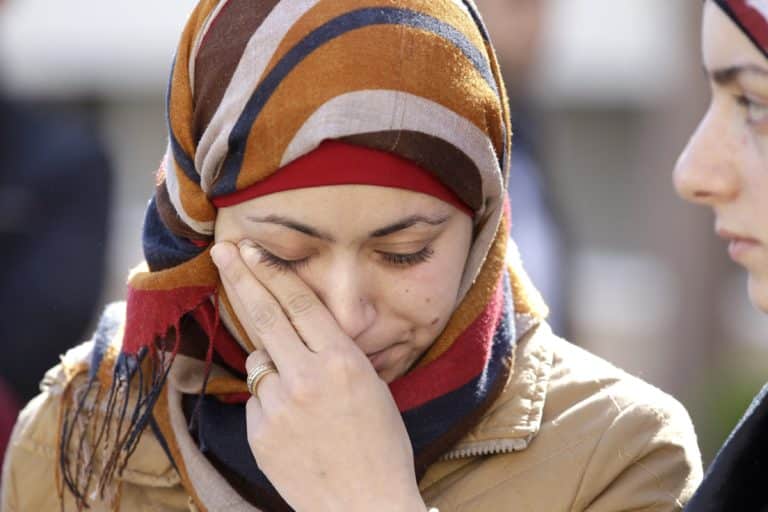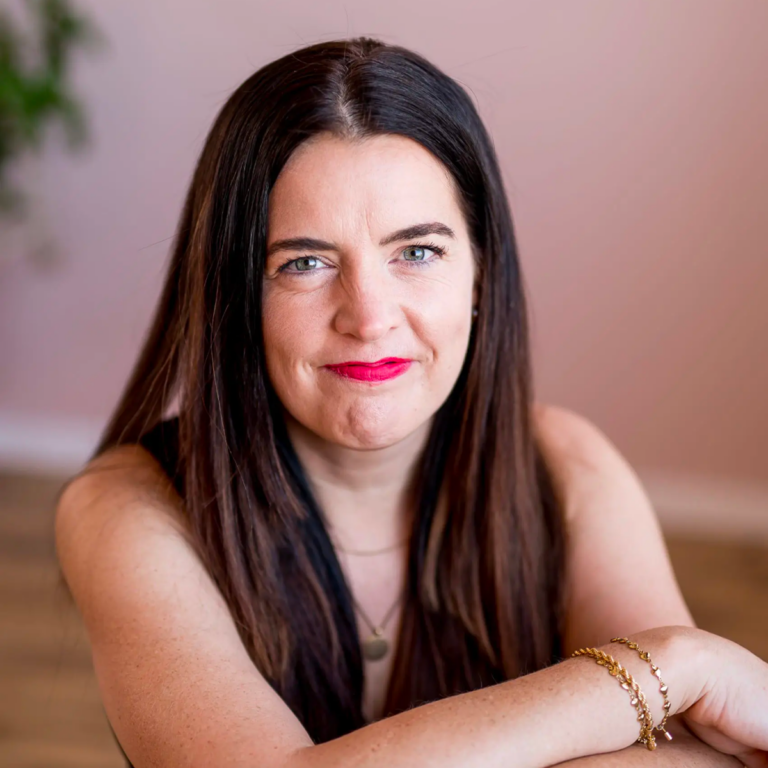
Anwar Tarawneh, the wife of Jordanian pilot Maaz al-Kassasbeh, grieves. Image by Khalil Mazraawi/AFP/Getty Images..
Grieving for the Jordanian Pilot, Grieving for All of Us
I won’t watch it.
I will not watch the ISIS-produced video that shows them burning the Jordanian pilot, Moaz al-Kasasbeh, alive.
I have seen a couple of still photos, and know the gruesome fate that Moaz met. This is as close as I have come to seeing hell on Earth.
My heart is shattered by the utter savagery of this brutal murder. I keep on praying for him, his family and loved ones, the people of Jordan, the families in Iraq who have met the same fate, and for all who may suffer in the inevitable response. I grieve for us as a human community. I grieve as I hear the call for “total retaliation” and wonder if we have not already confused justice and revenge. I grieve as I know that ISIS has to be uprooted and eliminated, and have no concrete plans about how to do so without introducing more and more suffering into a world already filled to the rim with it.
I grieve for Moaz, as I ponder the extraordinary suffering he went through in these last stages of life. It reminds me of the scene in Star Wars, where a planet is destroyed and the Jedi feel a massive disturbance in the Force. What would it be like if we could see that we are actually producing this type of suffering in the world. Suffering is not handed out by God, it seems.
We humans do a perfectly fine job imposing it on ourselves and one another.
I won’t watch the video, but I have heard enough experts comment on how sleek the video is, how it almost has the quality of a Hollywood movie. Yes, if one can speak of an “aesthetic,” the violence of ISIS is now packaged in a “snuff” film aesthetic that has learned from the repulsive tradition of the American horror film tradition. ISIS is not just a Middle Eastern phenomenon, but one that brings together the ills and vile traits of a globalized culture.
Oh his poor family. His mother, his father. How one grieves for them.
For months now, many of us have been saying that ISIS members are Muslims, but they are Muslim in the same way that KKK members are Christians. They are Muslims, but their every teaching represents a bastardization, an inversion, a violation of the teachings of the blessed Prophet.
Does one even have to point out that Muhammad categorically forbade burning human beings, saying that it was a punishment reserved only for hellfire, by the “Lord of Hellfire”? Check it out, it’s right there in the collection of his sayings (hadith) named Bukhari, considered the most authoritative collection of Muhammad’s teachings by Sunni Muslims. Then again, one wouldn’t expect ISIS members to know anything about the teachings of Muhammad. I remember learning from one of the escaped hostages that the ISIS members didn’t have a copy of the Qur’an to give him.
ISIS uses the spectacle of violence to promote themselves, to project an image of power. It is both a recruiting tool and also, in the literal sense, a means of terrorizing the larger world. I will not advance their agenda by further sharing their horrific images. I suggest we grieve and that we focus on the victims, the dignity of their lives, and the suffering of their loved ones.
How to remember them? How to honor them? I need something to take the place of these infernal images and videos. I need to remember Moaz in a moment where he was at peace, in joy. And I found two.
The first is an image of Moaz performing the Muslim pilgrimage (Hajj), visiting the House of God in Mecca. There he stands, serene and at peace, being drawn to the house built by Abraham to the One God.

The second image shows Moaz on vacation, standing before the Sultanahmet Mosque in Istanbul, enjoying one of the most beautiful spots on Earth — a place where Muslims, Jews, and Christians lived side by side in peace for centuries.

These are how I want to remember Moaz, honor his life, and vow to bring back to life that type of a reality for all of us.
Lastly, I wonder if there is a part of us that realizes that Moaz’s fate, this savage and brutal ending, is not unique. I wonder if we realize that the same infernal punishment, not recorded and not broadcast, has been the last life experiences of untold thousands.
I will not equate ISIS and any one government, including my own, but I wonder if through our grief and outrage we have the moral fortitude to recall that this burning of human beings alive is what happens when we rain death from skies upon a civilian population? Do we dare remember the painful words of the voice of that 20th-century Jewish prophetic voice, Rabbi Abraham Joshua Heschel, who was once asked by a confused journalist what he was doing in a peace rally. Heschel said: “I am here because I cannot pray.” The journalist pressed on, and Heschel clarified: “Whenever I open the prayerbook, I see before me images of children burning from napalm.”
This burning up of human beings is not the monopoly of ISIS, but is also on our own record.
And I wonder if there are those of us, Muslim and Jewish and Christian and Hindu and Buddhist and people of no faith and every faith who are going to stand up to the violence not just of ISIS, but also of our own government and insist that we cannot pray and will not pray as long as unjust and immoral violence continues.
I would want for that to begin with my own community of Muslims, to chant along with Heschel that “we forfeit the right to worship God” as long as unjust violence persists.
May love overcome hatred,
May compassion overtake violence,
May justice overtake indifference.

